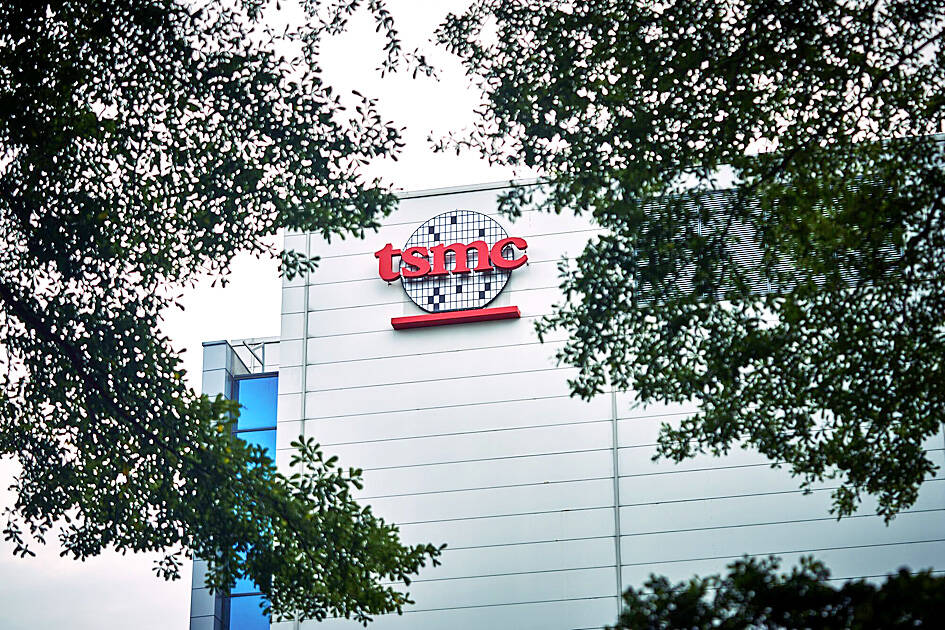Taiwan Semiconductor Manufacturing Co (TSMC, 台積電) is planning to build more plants in Europe with a focus on the market for artificial intelligence (AI) chips as the chipmaker expands its global footprint, a senior Taiwanese official said.
“They have started construction of the first fab in Dresden; they are already planning the next few fabs in the future for different market sectors as well,” National Science and Technology Council (NSTC) Minister Wu Cheng-wen (吳誠文) told Bloomberg TV in an interview that aired yesterday.
Wu did not specify a timeline for TSMC’s further expansion in Europe.

Photo: An Rong Xu, Bloomberg
TSMC in an e-mailed statement said it remains focused on its global expansion projects and has no new investment plans at this time.
TSMC, which is the world’s biggest chipmaker and produces most of its semiconductors in Taiwan, is spending tens of billions of dollars to set up new sites in the US, Japan and Germany, partly to hedge against rising geopolitical tensions with China.
It broke ground in August on a 10 billion euros (US$10.93 billion) chip fabrication plant in Germany’s Dresden for what is to be its first factory in the EU. About half of the funding for that project would be covered by state subsidies, with production slated to start by the end of 2027.
The AI market, including chips for US-based Nvidia Corp and Advanced Micro Devices Inc, would be the most important segment, while other semiconductor companies with alternative designs might also offer opportunities for TSMC, Wu said.
“Maybe they can work on the European market as well, so TSMC is looking for that for planning their next few fabs,” he said, adding that the company would need to evaluate whether to expand in Dresden or to build in other parts of the EU.
While established European chipmakers including NXP Semiconductors NV and Infineon Technologies AG are focused mostly on mature technologies for the industrial and automotive sectors, a number of next-generation chip designers have emerged in Europe, including Germany’s Black Semiconductor GmbH and Axelera AI in the Netherlands.
TSMC’s overseas factories are also creating opportunities for countries and cities nearby to secure investments from its suppliers. For the Dresden site, the Czech Republic appears to emerge as a winner as Prague and Taipei have deepened their relations in recent years.
The government is considering support for TSMC suppliers to invest in a Czech location that is close to Dresden, Wu said.
He said he is also seeking to facilitate joint research and development programs for academics in Taiwan and the Czech Republic.
Prague has official diplomatic relations with Beijing, but it has been forging closer trade and informal ties with Taipei. Several senior Taiwanese officials, including Wu, have traveled to the Czech Republic over the past year. Former president Tsai Ing-wen (蔡英文) is also visiting the country as the first stop of her European trip.
Separately, Wu said he expects Taiwanese chip firms to face further pressure to expand in the US regardless of the outcome of the presidential election next month. TSMC has so far pledged more than US$65 billion to create three plants in Arizona.
“Short term, maybe it is painful for Taiwanese companies, because it is more expensive if they move over there,” he said. “But in the long run, maybe it is good for them, from my point of view, because they can improve themselves.”

NEW IDENTITY: Known for its software, India has expanded into hardware, with its semiconductor industry growing from US$38bn in 2023 to US$45bn to US$50bn India on Saturday inaugurated its first semiconductor assembly and test facility, a milestone in the government’s push to reduce dependence on foreign chipmakers and stake a claim in a sector dominated by China. Indian Prime Minister Narendra Modi opened US firm Micron Technology Inc’s semiconductor assembly, test and packaging unit in his home state of Gujarat, hailing the “dawn of a new era” for India’s technology ambitions. “When young Indians look back in the future, they will see this decade as the turning point in our tech future,” Modi told the event, which was broadcast on his YouTube channel. The plant would convert

‘SEISMIC SHIFT’: The researcher forecast there would be about 1.1 billion mobile shipments this year, down from 1.26 billion the prior year and erasing years of gains The global smartphone market is expected to contract 12.9 percent this year due to the unprecedented memorychip shortage, marking “a crisis like no other,” researcher International Data Corp (IDC) said. The new forecast, a dramatic revision down from earlier estimates, gives the latest accounting of the ongoing memory crunch that is affecting every corner of the electronics industry. The demand for advanced memory to power artificial intelligence (AI) tasks has drained global supply until well into next year and jeopardizes the business model of many smartphone makers. IDC forecast about 1.1 billion mobile shipments this year, down from 1.26 billion the prior

People stand in a Pokemon store in Tokyo on Thursday. One of the world highest-grossing franchises is celebrated its 30th anniversary yesterday.

Zimbabwe’s ban on raw lithium exports is forcing Chinese miners to rethink their strategy, speeding up plans to process the metal locally instead of shipping it to China’s vast rechargeable battery industry. The country is Africa’s largest lithium producer and has one of the world’s largest reserves, according to the US Geological Survey (USGS). Zimbabwe already banned the export of lithium ore in 2022 and last year announced it would halt exports of lithium concentrates from January next year. However, on Wednesday it imposed the ban with immediate effect, leaving unclear what the lithium mining sector would do in the